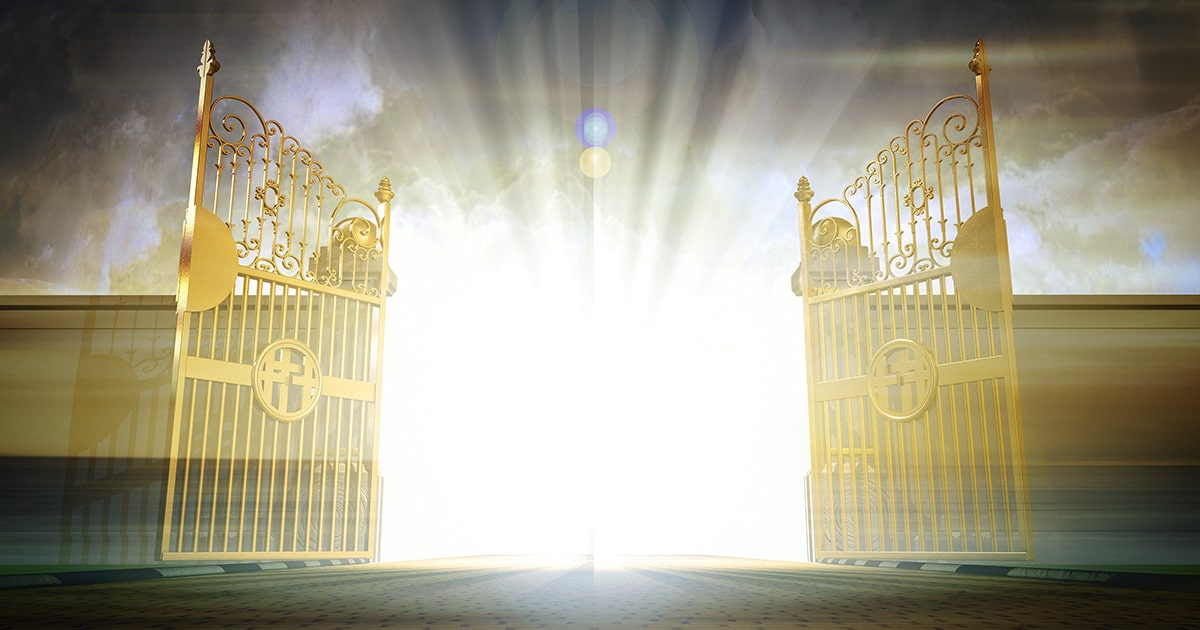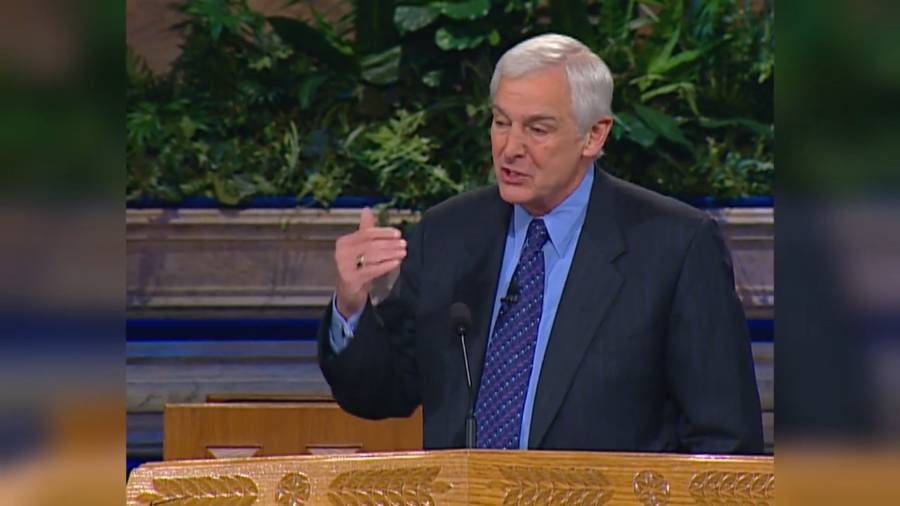
Do Dogs Go to Heaven? And Other Questions You've Wondered About Heaven
By David Jeremiah
What we think about heaven determines how we live today. I can tell you from my own personal experience and from my years of pastoral ministry and Bible teaching, when you study the biblical doctrine of heaven it will stir your heart and change your thoughts. The truth of heaven not only provides anticipation regarding our future, but it also comforts us on behalf of those who have gone before us. Heaven is already a heavily populated land, filled with glorious residents. When we arrive there, we’ll receive a grand welcome.
Here are answers to a few questions about heaven to whet your appetite and direct you to passages in the Bible you’ll want to study on your own.
Are the streets of heaven really paved with gold?
Gates made of pearl, a foundation of precious stones, streets of gold.... We’ve heard these descriptions of heaven—but these heavenly features are directly from the Scriptures. In the book of Revelation, John gives us a glimpse of the New Jerusalem in all its majesty:
She had a great and high wall with twelve gates, and twelve angels at the gates…. The construction of its wall was of jasper; and the city was pure gold, like clear glass. The foundations of the wall of the city were adorned with all kinds of precious stones:… jasper… sapphire… chalcedony… emerald… sardonyx… sardius… chrysolite… beryl… topaz… chrysoprase… jacinth… amethyst. The twelve gates were twelve pearls: each individual gate was of one pearl. And the street of the city was pure gold, like transparent glass (Revelation 21:12, 18–21).
This is the New Jerusalem—heaven’s capital—described in Scripture. And one day, we’re going to walk into this holy city in absolute wonder. Even the most beautiful places on earth cannot compare to what God has prepared for those of us who have placed our trust in Him.
Is there a purgatory?
There is no purgatory or middle holding ground for souls where they have a second chance to gain forgiveness for their sins. The Bible teaches that “it is appointed for men to die once, but after this the judgment” (Hebrews 9:27).
The Bible does describe an intermediate heaven. Every believer who died prior to the Ascension of Christ went to this intermediate place called Paradise (also called “Abraham’s bosom” in Luke 16:19–23).
But when Jesus ascended after His death, He entered into Paradise and took all who were there—all the Old Testament saints, all who had died and believed in God before the Ascension—with Him to the third heaven (Ephesians 4:8–10).
This means that believers no longer go to the intermediate heaven upon death. The soul and spirit of today’s believers rise immediately to the third heaven because Paradise is no longer an intermediate place; Paradise is now with God (2 Corinthians 12:2–4).
Do dogs go to heaven?
The Bible does not clearly state whether we will see our pets again in heaven, but Scripture suggests the presence of animals in heaven.
In Isaiah 11:6, we are told that during the Millennial reign of Jesus on earth, “The wolf also shall dwell with the lamb, the leopard shall lie down with the young goat, the calf and the young lion and the fatling together; and a little child shall lead them.” A similar scene is painted later in Isaiah 65:25. It’s clear there will be animals on earth during the Millennium and that predator and prey will live in harmony.
Later, John gives us a glimpse of heaven in Revelation 19:11, 14: “Now I saw heaven opened, and behold, a white horse. And He who sat on him was called Faithful and True, and in righteousness He judges and makes war…. And the armies in heaven, clothed in fine linen, white and clean, followed Him on white horses.” Jesus and His armies will ride white horses to capture Satan and the false prophet and cast them into the lake of fire forever.
It seems clear that there will be animals in heaven. It is uncertain whether the ones we loved on earth will be there. Whatever the case, we know the character of God and His love for us. He gives “good things to those who ask Him” and “gives us richly all things to enjoy” (Matthew 7:11; 1 Timothy 6:17). Heaven will be a place of joy and peace and the richest of blessings as we live in the presence of God and enjoy His good gifts for eternity.
What is the Lamb’s Book of Life, and will my name be in it?
The Bible says that in heaven there is a book called the Lamb’s Book of Life (Revelation 21:27). And the names of all who will be in heaven are recorded in that one book.
William R. Newell, a great Bible scholar, said there are four things to be noted about the Book of Life:
It is the absence of one’s name in the book, not the absence of one’s good works, which dooms a person.
Evil works are not the issue. Many of earth’s greatest sinners’ names are recorded in the Book of Life because they accepted God’s offer of salvation.
Those whose names do not appear in the book are cast into the lake of fire (Revelation 20:15).
All names found in the Book were written before the Judgment Day. There is no record of names being recorded (decisions being made) on that day.1
We cannot earn our passage to heaven simply by being a “good person” or by living a “good” life. Ultimately, we will not be granted entrance to heaven unless we repent of our sin and accept Jesus as our Lord and Savior—then we can have full confidence that our name is recorded in the Book of Life.
Will we know each other in heaven?
We will be recognizable in heaven, just as Christ was identifiable to His disciples when He returned to earth after His resurrection (John 21:12–13). But we will have new physical bodies that are designed for heaven, not earth.
Because we will be God’s people made over, we will be perfectly compatible with one another and able for the first time ever, to enjoy the intimate fellowship that we all long for in our hearts.
If heaven weren’t exciting enough, imagine having the unlimited opportunity to fellowship with people from all ages of history—even people we’ve only read about in books.
There’s a whole list of people I’d like to meet: David and Joseph and Daniel from the Old Testament, C. S. Lewis, Charles Haddon Spurgeon, Andrew Murray, A. W. Tozer, and many others.
What an incredible time of fellowship! We can’t possibly comprehend it completely, but we’re going to live together in community and be able to have unlimited fellowship with one another for all of eternity.
Do I have a “guardian angel”?
As far as I can determine, there are just two verses in the Bible that indicate there might be guardian angels in the world today. The first is Matthew 18:10: “Take heed that you do not despise one of these little ones, for I say to you that in heaven their angels always see the face of My Father who is in heaven.” Apparently, some of God’s angels are assigned to stand ready before the Father to respond instantly to His command for protection and care over these children. Jesus calls these angels “their angels.” And that’s why some people have used this passage as proof that everyone has an angel.
The second passage that seems to support guardian angels is in Acts 12. After Peter was released from jail, he went to the home of Mary where a group of Christians was praying for his release. A servant named Rhoda answered Peter’s knock at the door. She was so excited to hear his voice, she left him outside as she ran to tell the believers Peter was at the door. They didn’t believe her and reasoned the person at the door must be Peter’s angel.
Now those are the only two passages that I’m aware of that allude to the idea of guardian angels. Having said all of that, let me also present to you the other side of the story. While many believers throughout church history have believed in guardian angels, others have rejected the idea, feeling these two texts are not proof enough to construct such a doctrine. Throughout Scripture, there were many times when more than one angel was called into action on behalf of one of God’s chosen. Several angels carried Lazarus’ soul to Abraham’s bosom. And Elisha and his servant were surrounded by many angels. The psalmist writes that all the angels rally for the protection of one saint.
We can’t know with absolute certainty whether each believer has a guardian angel. We do know that God’s angels care about us, and they can intervene in our lives as they are called by God—and that’s a wonderful thought!
How big is heaven?
The Bible doesn’t tell us the full expanse of heaven, but it does give us the measurements of the New Jerusalem, the capital city of heaven. It will easily be able to house all the people who have ever trusted in Christ. And this heavenly city will not be crowded by any means.
In Revelation 21:16, John says, “Its length, breadth, and height are equal,” each “wall” measuring 12,000 furlongs. This means the New Jerusalem is about 1,500 miles high—that’s more than 2 million square miles on the first “floor” alone! And given that this city is cubical, we can assume that it will have more than one level. We cannot fathom the grandeur of this place. It will be unlike anything we have ever seen, and there is no question that it will be able to house every believer who has ever lived.
Can people really go to heaven and return?
It seems every month a new book hits the bestseller list with details about someone’s near–death experience, during which they say they glimpsed scenes of heaven. I take those stories with a grain of salt because they don’t represent our definitive source of information about heaven, which is Scripture.
Only one person in Scripture gives a firsthand account of heaven: the apostle John. That’s how we have the book of Revelation!
Revelation 4:1 tells us John was given a vision of heaven. He saw a door open and found himself peering through a portal into heaven itself. When God allowed John to see a glimpse of the beauty, brilliance, and worship in heaven, he obtained a new perspective on his life here on earth. His exile in Patmos, though difficult, was seen in view of the home that God has prepared for us—a home that is just as real as our temporary dwelling but is inexplicably glorious and will last for all eternity.
1William R. Newell, The Book of The Revelation, 9th edition, (Chicago: Moody Press, 1953), 334.















